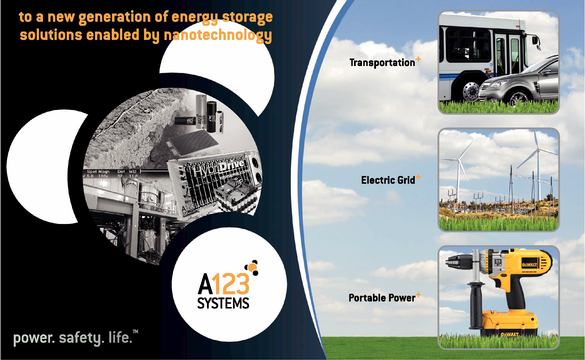An SEC filing offers a rare glimpse into the workings of a promising battery company.
Prospectus

An exciting battery company called A123 Systems, a startup based in Watertown, MA, that has commercialized materials developed at MIT, has filed documents announcing an initial stock offering. The company, which has received considerable favorable attention in the press, including in the pages of Technology Review, has developed a battery that it claims is safer, lasts longer, and delivers more power than other lithium-ion batteries. What's particularly remarkable about the company is that, although it's a small startup, it has garnered the attention of major companies, including General Motors, which is testing A123's batteries for potential use in an upcoming electric car. In cooperation with these companies, A123 is currently designing and developing batteries for 19 different vehicles.
The company's prospectus, filed with the Security and Exchange Commission (SEC) last Friday, contains some tantalizing glimpses at less public details of the company. The 19-models figure mentioned above, for example, comes from the prospectus. But what's perhaps more noteworthy, given the company's favorable attention, is the detailed list of the risks that it faces--things that company execs downplay during interviews. The list underscores just how difficult it is for newcomers to break into the lithium-ion industry--even with the sort of promising tech that A123 has developed. Established battery makers have more resources and already have close connections with and commitments from automakers. From the prospectus: "Our principal competitors have, and any future competitors may have, greater financial and marketing resources than we do, and they may therefore develop batteries or other technologies similar or superior to ours or otherwise compete more successfully than we do."
A123's success so far is due to its ability to develop ways to manufacture its nanostructured materials. The company's competitors might solve similar problems themselves and produce batteries that could outperform A123's. A123 has responded by investing heavily in research and development.
The prospectus also gives a glimpse into the challenges of working in China, where A123 manufactures most of its batteries. In addition to worrying about trade relations between China and the United States, the company has to deal with a patchwork legal system, poor protection of patents, and business practices that put more value on personal relationships with senior management than on contracts. If A123 Systems continues to be successful, its ability to navigate these and other challenges will make it a good case study in what it takes to move tech out of the lab and into a highly competitive, international industry.



No comments:
Post a Comment